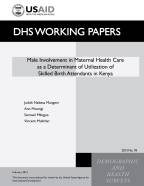
Abstract:
Objective: To determine whether there is a
relationship between male involvement in
maternal health and utilization of skilled
birth attendants (SBAs) after controlling for
socio-demographic and maternal
characteristics.
Design: Data from the Kenya Demographic and
Health Survey(KDHS) conducted in 2008–09 were
analyzed. We fitted an unadjusted logistic
regression model and, to control for
confounders, an adjusted binary logistic
regression model to look for associations
between utilization of an SBA, on one hand,
and, on the other, socio-demographic
characteristics of the
woman, male perceptions about maternal
health, and male attendance at an antenatal
care (ANC) visit.
Setting: Nationally representative survey in
Kenya.
Subjects: The unit of analysis was couples
who met the inclusion criteria of being
married and having had a child in the three
years before the survey. To ensure that the
couples were reporting on the same child, we
picked couples who gave the same age for
their last child. The final weighted sample
size was 730 couples.
Results: The adjusted odds ratio after
controlling for other factors indicates that
women whose husbands attended at least one
ANC visit were more likely to have skilled
birth attendance than those whose husbands
did not attend any ANC visits [AOR, 1.9; 95
percent CI, 1.09-3.32]. Maternal
characteristics that had a statistically
significant association with
delivery by an SBA included educational
level, employment, number of ANC visits, and
parity. The province where the couple resided
also was statistically significant.
Conclusion: In Kenya a male partner’s
participation, through attending ANC visits,
is associated with a woman’s use of an SBA
during delivery.
 Male Involvement in Maternal Health Care as a Determinant of Utilization of Skilled Birth Attendants in Kenya (PDF, 195K)
Male Involvement in Maternal Health Care as a Determinant of Utilization of Skilled Birth Attendants in Kenya (PDF, 195K)
